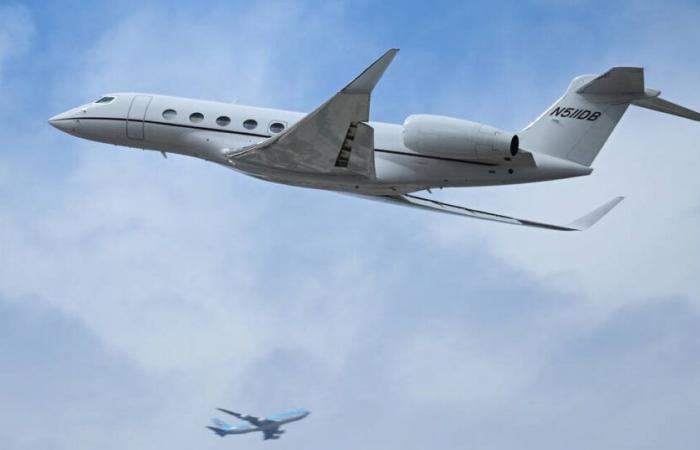Used by less than 0.01% of the world's population, business jets have seen their emissions increase by 46% since 2019, according to a study published this Thursday, November 7. The authors recall the urgency of regulating their use.
The ultra-rich have not finished destroying the climate. A study published this Thursday, November 7 in the scientific journal Communications Earth & Environment reveals that CO2 emissions linked to private jets increased by 46% between 2019 and 2023 worldwide. An even greater increase than that due to commercial flights, which after a strong rebound have exceeded the pre-Covid level. Business jets are very energy-intensive, but the number of machines, flights, and distances traveled continue to soar.
In 2021, the NGO Transport and Environment calculated that private jets released on average ten times more carbon than airlines, and were 50 times more polluting than trains. Used by 0.003% of the population, these machines alone released at least 15.6 million tonnes of CO2 in 2023 according to the authors of the new study, the equivalent of the annual emissions of 2 million French people. “Analysis shows that people using private jets emit disproportionately compared to an average human being,” note the authors. The press release intended for journalists even specifies that “some individuals who regularly use private aviation can produce almost 500 times more CO2 in a year than the average individual.”
Flights of less than 50 kilometers
To calculate these emissions, the authors used data from a platform, ADS-B Exchange, which records air traffic around the world. They took into account 72 different models of private jets, whose consumption ranged from 182 to 2,108 liters of fuel per hour. In total, 18.6 million thefts were recorded between 2019 and 2023. “Most air traffic takes place in the United States, followed by Europe. The capitals of Central America (Mexico City, Guatemala, San José and Panama), as well as the Caribbean (Turks and Caicos Islands, Anguilla, Barbados, Cancún) are very busy, as is the Middle East. they detail. Nearly half of the flights are used to cover distances of less than 500 kilometers, that is to say the equivalent of a Bordeaux-Paris flight. Worse, private jets “often seem to replace cars for reasons of time or convenience, as shown by the 4.7% share of very short flights, less than 50 kilometers”, says the study.
The journeys are not limited purely to business flights, it appears that the majority would be for leisure given that many flights take place on weekends and summer. The authors also looked at traffic spikes generated by global events. Among them, the 2022 Football World Cup in Qatar (14,700 tonnes of CO2 emitted by 1,850 private jets), the World Economic Forum in Davos in Switzerland (7,500 tonnes emitted by 660 jets) or the Cannes Film Festival ( 4,800 tonnes of CO2 released by 640 jets). The identity of the owners or tenants of the devices, as well as the number of travelers per flight, could not be studied. Likewise, the pollution induced by the manufacturing of jets is not taken into account and only the fuel expenditure during the flight is calculated.
A regulation that is struggling to impose itself
Scientists point out that despite the fact that private jets consume less per kilometer in 2023 than in 2019 thanks to energy savings, the increase in traffic has led to a net increase in emissions, and this will further increase. “The industry expects an additional 8,500 business jets to be delivered over the 2024-2032 period, notes the study. Business aviation will therefore likely become an increasingly important source of emissions in relative (share of global emissions) and absolute (total sector emissions) terms.” Bad news in a context where humanity must reduce its emissions in all sectors to hope to stabilize climate change as quickly as possible.
The authors, of Swedish, German and Danish nationality, recall that the global growth of emissions is propelled by the richest classes and call for a “regulation” of the private jet sector (via taxes and/or flight limitations) to reduce their impact. In France, at the beginning of 2023, an environmental bill was tabled in the National Assembly to put an end to private jet flights with fewer than 60 passengers. “departure from, destination or within French metropolitan territory”. But she did not convince the deputies.






